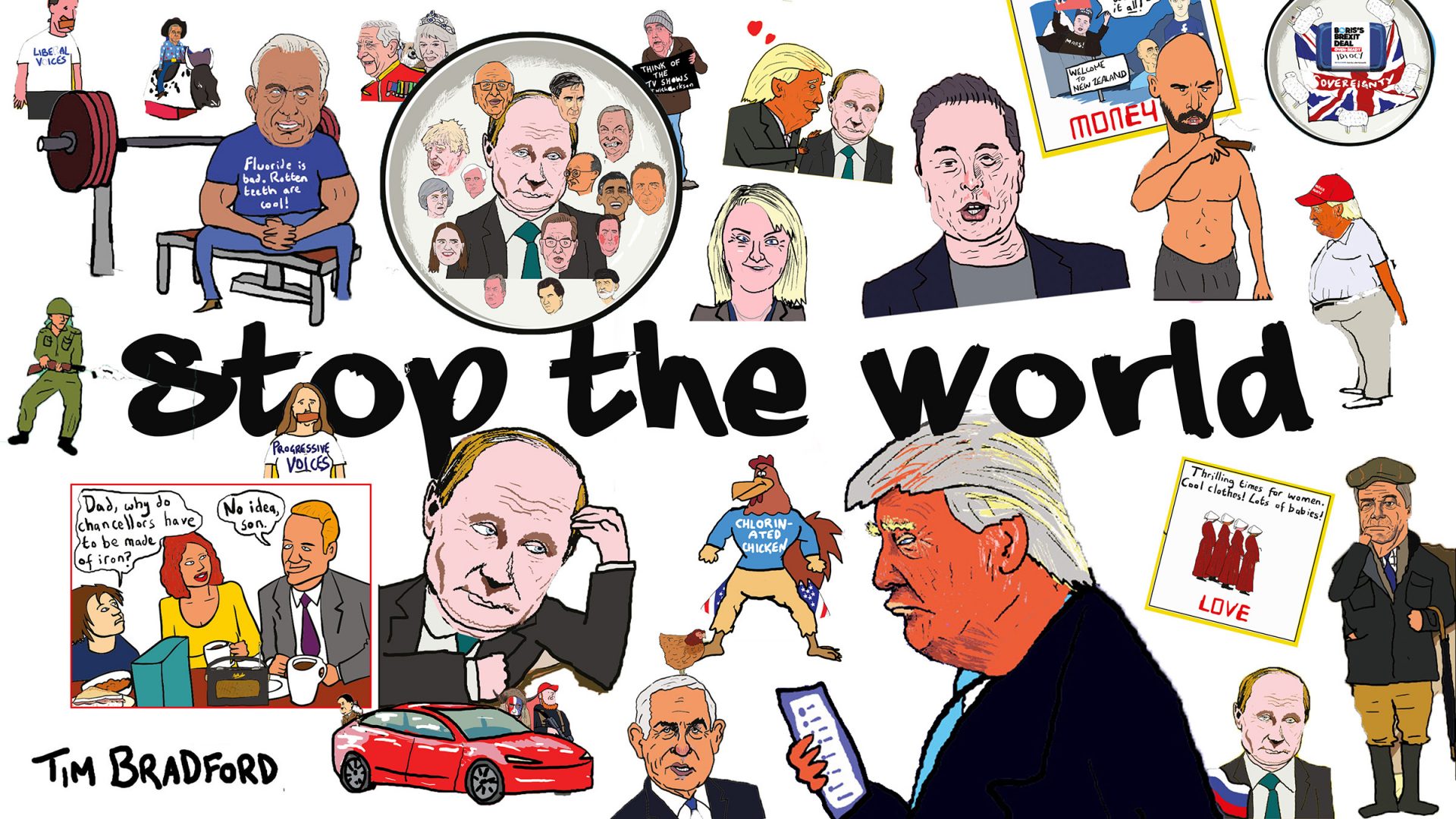In May of this year, Paul Marshall, dressed in a suit but no tie, paired with trainers, took to the stage of Wadham College, Oxford, to modest applause. In the prestigious environs of Holywell Music Room – Europe’s oldest custom-built concert hall, situated in the country’s oldest university – Marshall was preparing to give the Pharos Spring Lecture to the assembled attendees.
Marshall, though, is no Oxford don or lecturer. Instead, he is a multimillionaire financier who made his money as a hedge fund manager, a devout Christian philanthropist who founded the Ark academy chain of schools, and a former Liberal Democrat.
Marshall, 66, told the audience at his lecture that his parents met just yards away from that lecture theatre, and he studied at Oxford himself after a west London upbringing. His wife, Sabina de Balkany, is a French national who runs an antiques business on the King’s Road in Chelsea. His son, Winston, the former bassist of Mumford & Sons, now hosts a culture war-heavy podcast and contributes to his father’s causes, while his daughter, Giovanna, is a classically trained musician.
Marshall describes himself as a “classical liberal” whose politics are deeply informed by his Anglican Christian faith. He is an admirer of the Austrian economist Friedrich Hayek, and shares his icon’s deep hostility to anything resembling socialism. Marshall has warned that central control is “a danger that applies as much if not more to the media as it does to economics”, describing the BBC as “a giant toad” atop the media landscape. His approach is perhaps best summarised in a 2021 article in which he stated: “Traditional British liberalism rests on the Judeo-Christian understanding that we are all, in moral terms, fallen creatures.”
But none of that is why he was on stage at Oxford. Instead, he was there to give a lecture faux-modestly subtitled “Reflections of an accidental media owner”, discussing the right wing UK outlets he has either founded or purchased in recent years – in turn UnHerd, GB News and most recently the Spectator. These media properties alone have helped to reshape the modern right in Britain: the GB News channel has almost every right wing politician of note on its payroll, while its coverage dominates the brain space of the rest. The opinion website UnHerd pushes the envelope, while the Spectator magazine and its site cover the establishment right.
Marshall claims to have built this media empire in an “almost unplanned way”. “What I was frankly unprepared for,” he told the assembled crowd in the manner of the little guy striving to make it big against the odds, “was the determined, organised, devious nature of the opposition I would face.”
The reality is radically different. In a few short years, Paul Marshall has built up the biggest influence network that UK politics has ever seen – with his media properties being just the most visible part.
Marshall controls, co-founded, donates to, or otherwise influences an operation incorporating media, charities, think tanks, conferences, and more. It pumps out the views of an increasingly extreme British right and rewards those who express them.
Marshall’s network, laid out to its full extent for the first time by The New World’s special report, gives him end-to-end influence in the right wing sphere. Marshall and his associates can spot rising stars and give them early media coverage, and op-ed slots. They can burnish their credentials with think tank fellowships, book grants, and academic respectability. When they’re ready, they can keynote ARC (Alliance for Responsible Citizenship) conferences, and host TV shows. If you agree with what he thinks, Paul Marshall can make you a star, and rich.
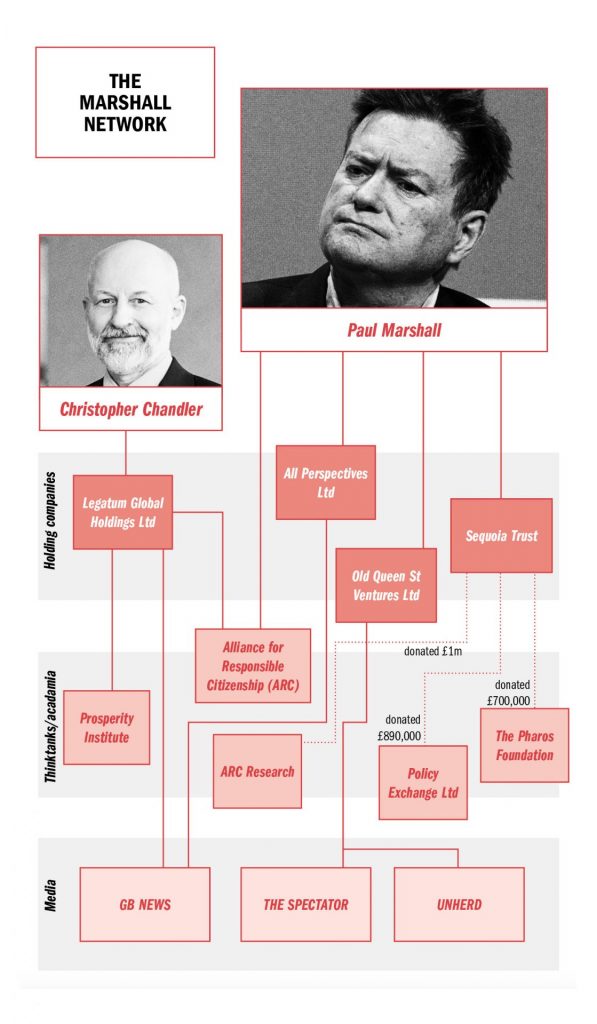
Marshall is a one-man demonstration that donating directly to political parties is an outdated way of influencing politics. Years of loyal contributions often get the contributor little more than invitations to sit near MPs at dinners with interminable speeches, with the vague possibility of a knighthood or a peerage some time down the line (though as this practice is officially banned, no one can complain too loudly if these never materialise). In exchange, donor and recipient alike can expect endless media scrutiny as every payment must be declared. Over time, many one-time political donors have decided the whole process is more hassle than it’s worth.
Instead, they look to America, and to the triumph of Project 2025. By working outside political parties, a movement can build a whole ecosystem largely free of interference. Funding can go to whatever priorities those giving it like, transparency requirements are minimal, and politicians get the benefits of deniability – Donald Trump spent all last summer denying he’d ever heard of Project 2025, only to put its architect, Russell Vought, in charge of the US budget.
Any modern political project needs to extend beyond political parties. Trump 2.0 had Project 2025 and its infrastructure. David Cameron’s austerity found support and cheerleaders in the Tufton Street network of think tanks and lobby groups that promoted Brexit and opposed climate change action.
Today, there is an ecosystem backing a populist right wing takeover of the UK, whether it’s in Conservative or Reform clothing – and Paul Marshall’s network lies at its heart. Here, we lay it out in the open.
The media outlets
The most obvious outposts of the Marshall influence network are his media outlets – and their development also tracks the evolution of Marshall’s personal politics. As so often, this largely started with Brexit: Marshall was a longtime Liberal Democrat backer who had broken with his old tribe over Brexit, which he supported but the Lib Dems fervently opposed.
Working with former Times comment editor Tim Montgomerie, Marshall provided the finance to launch UnHerd as a new UK media outlet – with an attached private members’ club – which was genuinely heterodox in its views, signing up prominent writers from the left and from the right, often from well within the mainstream.
Both UnHerd and Marshall appeared to drift rightwards in the years that followed. In 2021, Marshall’s son, Winston, was forced to step down from Mumford & Sons amid a row over his endorsement of a book on Antifa by the alt right media personality Andy Ngo. Marshall Jr initially apologised for the endorsement, but then retracted his apology and more openly embraced the right. The incident seemed to install a hatred of cancel culture and the broader establishment in father and son alike.
UnHerd still has some mainstream columnists and editors, still runs some pieces from the left, and has courted controversy by running articles and writers generally regarded as well beyond the pale by most – including apologists for Russia’s invasion of Ukraine, and Covid controversialists. Its bread and butter, though, is endless reruns of culture war and cancel culture issues, from a long list of usual suspects – culminating in the site securing the first European sit-down interview with JD Vance after he became US vice-president.
While UnHerd may have tracked the political journey and interests of its owner, it is generally almost an afterthought where Marshall’s media empire is concerned – the site is perhaps the least discussed of the three properties, at least in Westminster circles.
Instead, it is GB News that attracts the real attention, despite being almost written off as a joke during its launch four years ago. Marshall is one of a small group of investors behind the channel, alongside co-investor Christopher Chandler, a Dubai-based multimillionaire who founded the global investment company Legatum.
When it first went on air, GB News was a farce. In early broadcasts the studios were falling apart, the lighting was off, sound failed, and the network was barely capable of cutting to outside reporters or running a live report. The launch was such a failure that the company’s first chairman and star anchor Andrew Neil acrimoniously parted ways with the station after just a few months – but in time GB News found its feet, even as it battled an advertising boycott organised by the campaign group Stop Funding Hate.
Financially supported by Marshall and Chandler, GB News could afford to press through its farcical launch and build up an audience that now routinely rivals that of the BBC News channel and Sky News. Its growing transatlantic influence was highlighted by the recent launch of its nightly DC news show, helmed by the conspiracy theorist Bev Turner.
On September 3, she joined Marshall and Nigel Farage, paid handsomely for his GB News shows, at the launch party for GB News’s DC newsroom. Just days later, when Trump visited Britain, Turner was rewarded with a seat on Air Force One – a perk usually reserved for only the top reporters from US media outlets, not foreign press – and was given the first question from Trump at the subsequent press conference. GB News has a relatively small but devoted audience, and political ties that are getting it noticed.
Marshall’s speech in Oxford showed that he knows his position is likely to get stronger. In 2018, Rupert Murdoch sold Sky to the US broadcaster Comcast. One condition of the sale was that Comcast committed to fully fund Sky News for a decade after the acquisition – a deal that comes to an end in 2028, leading many to speculate Sky News will be drastically cut or even closed.
By then, Marshall boasted, “we will be left with two dominant news channels: the BBC representing the centre left, and GB News representing the centre right”. Marshall and the other backers of GB News don’t need to do anything other than wait to be guaranteed a breakthrough – and they know it.
Suggested Reading


Paul Marshall, creature of the right
Boasting of how advertisers had eventually returned to his channel despite Stop Funding Hate’s efforts, Marshall even sounded what looks a lot like a warning. “It would be an unwise CEO who did not advertise with GB News,” he said.
To judge GB News’s influence just by its audience and as a TV channel, though, is to miss the point. The real power of the channel is embodied in its relationship with a single man: Farage, the current leader of the top-polling political party. Since his election as member of parliament for Clacton last year, Farage has received £413,360 from GB News, not counting VAT – more than four times the salary he gets for being an MP.
More than that, the frontbench politician, who is a viable contender to be the next prime minister of the UK, gets to present a TV show for an hour a night, four nights a week, talking directly to potential voters. The evening after Keir Starmer’s speech to Labour’s party conference, Nigel Farage hosted a show. The day of Kemi Badenoch’s speech, Farage was there with the rebuttal.
The UK’s political rules were simply not built for this kind of situation. Because GB News doesn’t class Farage’s show as “news”, there is no Ofcom rule against a politician presenting a TV show nightly. There is similarly no parliamentary rule against a frontline politician getting four times their salary from a TV network.
And, except in the immediate run-up to elections, there is no requirement on GB News to balance Farage’s airtime with other political networks. This is not a situation anyone imagined when the rules were written.
Having Farage on the GB News roster would be influence enough, but in reality GB News has collected many more frontline politicians. The channel signed up former prime minister Boris Johnson with great fanfare, though he rarely appears on the network and the documentaries he was supposed to front have yet to materialise.
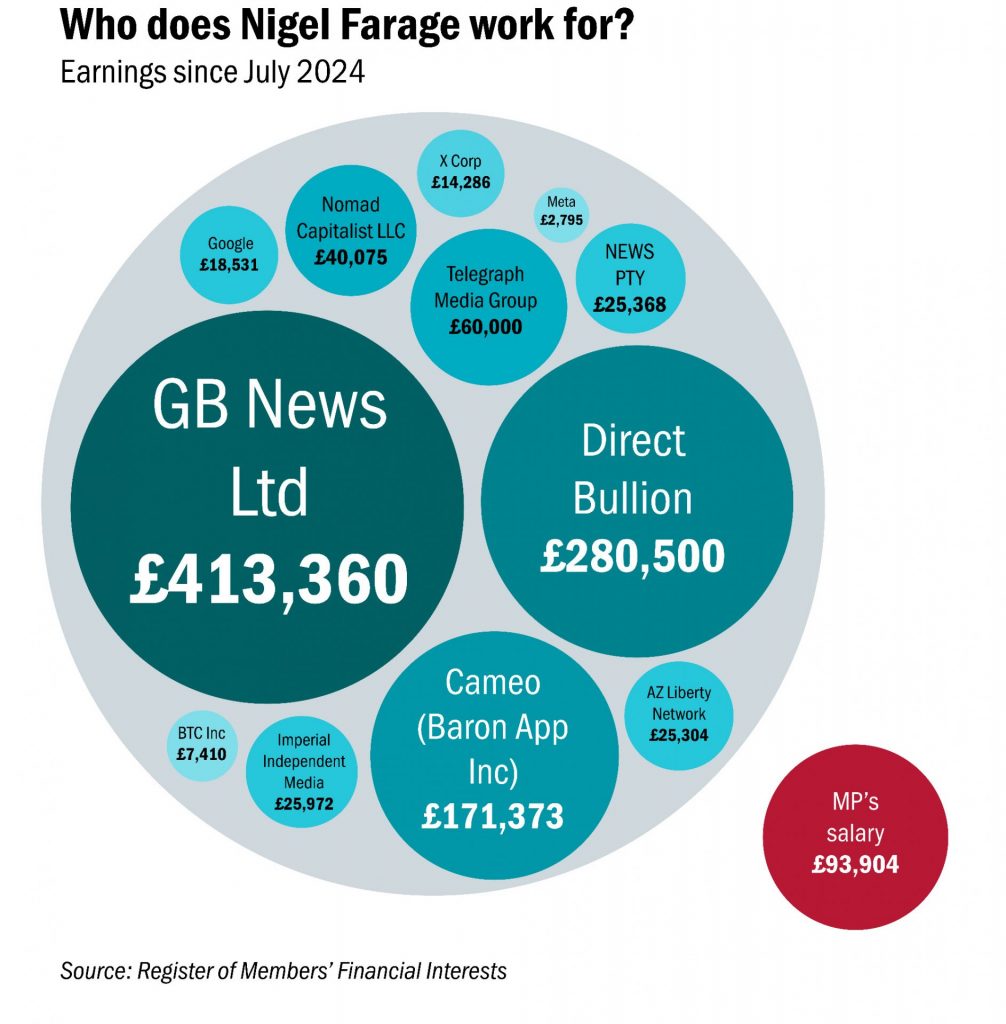
GB News’s current roster includes former cabinet ministers Jacob Rees-Mogg and Michael Portillo, alongside former Conservative MP Miriam Cates. Reform’s chief whip, Lee Anderson, takes his party leader’s timeslot on Fridays, while former Labour MP Gloria De Piero is also a host. Tory MP Esther McVey and her former MP husband Philip Davies used to be on the presenting roster, but have since left.
Whether it is left unspoken, or said overtly but quietly behind the scenes, the message is clear – GB News can make you a star, and it can be part of your retirement plan after you’ve left the channel. Stick to its line and its messages, grow your popularity with its base, and there might be a home for you. Doubtless some of its young and ambitious hosts will see a GB News show as their path into politics.
Serving politicians on board with its agenda can, apparently, host their own shows – and former politicians can claim a payday. Even when Rupert Murdoch was at the height of his powers, he had nothing to resemble the symbiotic relationship GB News has been allowed to build with the UK’s political right – and which has been left unchallenged.
For all that Marshall, Farage and others complain about left wing dominance of broadcast media (they can hardly claim the left dominates print), there has never been anything like this for Labour politicians or anyone else. George Soros, the frequent bogeyman of the right and supposed influence-peddler supreme, has never had anything close.
Significantly, GB News is not a profitable operation – nor is it anywhere close to it. In its most recent accounts, GB News made just under £16m in revenue, but lost £33m – a “profit” margin of minus 200%. That means the channel needs a new cash injection of tens of millions every year just to keep operating, even four years after its launch. Evidently, it is not being run to make money: it serves a different purpose.
Most recently, Marshall has rounded off his media empire with the purchase of the Spectator, the bastion of conservatism that once employed Boris Johnson as its editor. Ostensibly, UnHerd’s urbane editor-in-chief, Freddie Sayers, now has oversight of the Spectator too, but Marshall scored a coup over Rupert Murdoch by persuading Michael Gove to take the editor’s chair on completing the purchase – another former cabinet minister for his collection.
Paul Marshall now has a significant stake in three different outlets appealing to three different factions within Britain’s right. He will not be issuing the staff of each with detailed orders of what to write – proprietors rarely need to do so. But it would be virtually impossible for a new politician of the right to rise to the top without the support of at least one of the three outlets, and everyone concerned will surely know that.
In his conclusion to his remarks at Oxford, though, Marshall promised he was the good kind of media owner, someone who understood it as “a sacred trust”, adding that “we all need to hold ourselves to a high standard of responsibility, which means a dedication to telling the truth as far as we see it.”
Warming to his theme, he continued: “George Orwell used to say that the essence of journalism is printing what someone does not want printed. Everything else is public relations. This is my mantra for UnHerd, for GB News, and for the Spectator.”
The quote is a well-known one, and it’s often attributed to the writer of Nineteen Eighty-Four. But sadly for Marshall, and the “higher standard of responsibility” he supposedly sets for himself and his outlets, there’s no record that Orwell ever said it.
Convening
The Alliance for Responsible Citizenship’s conference has become one of the biggest global gatherings of the new right, at least outside America. This year’s conference was headlined by the psychologist turned ultra-conservative pundit Jordan Peterson. It also featured right wing figures like Farage, Kemi Badenoch, Mike Johnson, the Republican speaker of the House, former Republican candidate Vivek Ramaswamy, pundits Douglas Murray and Niall Ferguson, and a parade of similar figures. The 2026 conference is already promising to host 4,000 people in person in London, and stream to millions more worldwide.
Stories of the organisation’s founding tend to focus on Peterson himself as a co-founder, alongside ARC’s CEO, Philippa Stroud, the Conservative peer and former special adviser to Iain Duncan Smith. But the company’s ownership documents tell a somewhat different story – filings at Companies House show that ARC has just two directors: Paul Marshall, and another partner of the Dubai-based finance company Legatum.
The document of “persons with significant control” over the operation lists Marshall alongside four Legatum partners – and when the largely dormant company once named “Prosperity UK 2017 Limited” was relaunched as the Alliance for Responsible Citizenship in 2023, it was funded with a £1m contribution from Marshall.
After just two years of operation, ARC could attract Mike Johnson, the most powerful Republican legislator in the US, to its conference just weeks after Trump’s inauguration, and has Peterson – arguably the most famous intellectual of the new right – as its keynote speaker and ostensible founder.
ARC’s mission statement argues that the west is at “a defining moment in our societies”, for which it is “drawing together a unique alliance from around the world, covering politics, business, technology, culture, law, academia, the arts and more”. Its ambitions are not small. In that same mission statement, it says that “connecting, gathering, and equipping an international movement is the key to re-laying the foundations of our civilisation”.

The ARC conference has become one of the biggest global gatherings of the new right
ARC’s website lists some of the highlights of 2025’s talks at its conference. A talk by US republican commentator David Brooks is titled “How the Elite rigged Society (and why it’s falling apart)”. A discussion between Peterson, the journalist Louise Perry and others promises to reveal “The Dark Truth of The Sexual Revolution (Nobody Wins)”. Eric Weinstein, the managing director of Peter Thiel’s venture capital firm, warns “You’re in a War (and You Don’t Even Know It)” – while Paul Marshall himself gave a talk titled online “Europe’s going bust over Net Zero”.
Conferences are powerful things, playing multiple roles all at once in the political system. The first is that they generate headlines and noise, both within Marshall’s own outlets and beyond them. When leading politicians speak in public, media outlets will gather and take notice – lending credibility and a broader audience to other speakers given a slot on the same stage.
There is also the obvious power of convening and networking created by organising such events. They are an easy way to get people in the same room, to make connections, and to build alliances. They are an easy way to get extra value out of media outlets and media stars – a GB News host can interview someone on stage, then on their show. Rising stars can be given a platform to speak – potentially getting them on to the lucrative American speaking circuit. Patronage gets yet another outlet.
Media outlets get to report the news and decide how they shape it, while an organisation like ARC gets to make news, and pick who has a stage. Both of these are machines that need to be fed, however – they need narratives, ideas and perhaps even policies. That requires an additional stage of development. Ideas can come from political parties, or specialist charities, but more commonly in modern politics they come from think tanks – and Marshall and co have these well covered, too.
Think tanks
Last month, a cross-party grouping of prominent politicians gathered in a well-appointed events room in an office on the top floor of a luxury Mayfair townhouse. Former home secretary Suella Braverman and Brexit negotiator and Conservative peer David Frost sat alongside Reform Party deputy leader Richard Tice to make the case as to why the UK should become the first country to voluntarily leave the European Convention on Human Rights – joining Russia, which was expelled from the convention after invading Ukraine in 2022.
Braverman, according to the Guardian’s Peter Walker, showed “quite a flashy film” making the case against the convention and “human rights” law more broadly, claiming it had prevented the convictions of protesters in Bristol who had rolled a statue of the slaver Edward Colston into the sea – ignoring that they were, in reality, acquitted by a jury of their peers.
Whatever the weaknesses of their argument, Braverman, Tice and Frost are winning: Reform has pledged to leave the ECHR, and last week the Conservative Party pledged to do the same, even though it could jeopardise peace in Northern Ireland and risk the UK’s post-Brexit trade deal with Europe.
The politicians were sitting in the office of the Prosperity Institute think tank, presenting the “roadmap to freedom” the organisation had prepared after being welcomed and introduced by its managing director, Dr Radomir Tylecote.
The think tank is currently little-known but well-funded – until January of this year, it was known as the Legatum Institute, named for the Legatum investment fund of which it was and still is a subsidiary. Its rebrand to Prosperity – a name that had evidently been rolling in the minds of Legatum’s founders for some years, given that the company that became ARC had previously shared its name – was part of a drive “to accurately reflect its mission to promote the prosperity of individuals, families and communities, in the UK and beyond”.
Suggested Reading
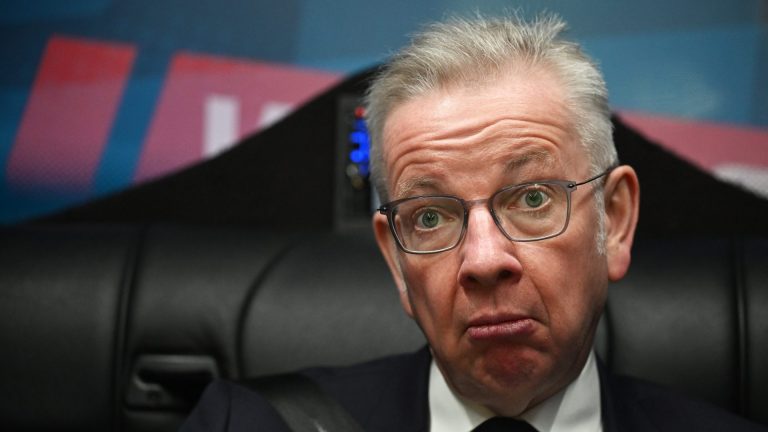

The Spectator plays down Gove’s role in Mone scandal
Paul Marshall has no role in the Prosperity Institute, but the partners at Legatum, with whom he owns both ARC and GB News, operate it instead.
Legatum was founded by the famously private billionaire Christopher Chandler, who was born in New Zealand and who holds citizenship in Malta. Legatum itself is headquartered in Dubai, a recent favourite of the new right.
Richard Tice, who alongside his partner, Isabel Oakeshott, splits his time between Dubai and the UK despite his role as a Reform MP, claimed in May that the UK had much to learn from “low-crime” Dubai, while the billionaire property developer Nick Candy, who now serves as Reform’s treasurer, recently claimed “today you are more likely to find the values we grew up with in Dubai and Abu Dhabi”.
Suggested Reading
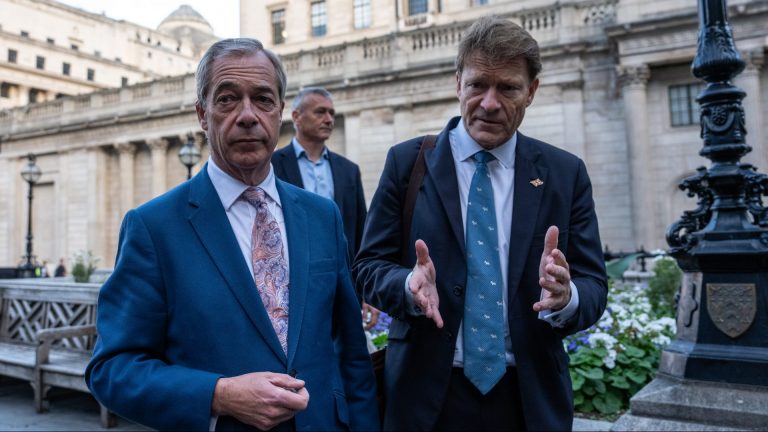

Reform, Farage and Tice: it’s all about the money
In reality, Dubai incorporates Sharia law into its legal system, and while 88% of its population are migrant labourers, they are routinely abused and face modern-day slavery concerns.
Dubai and the United Arab Emirates score 18 out of 100 on Freedom House’s index. In Dubai “political parties are banned, and all executive, legislative, and judicial authority ultimately rests with the seven hereditary rulers,” the respected NGO notes. “The civil liberties of both citizens and non-citizens are subject to significant restrictions.”
Despite both Legatum and Chandler’s apparent lack of connection to the UK, Legatum provides generous support to the Prosperity Institute. The think tank is granted a peppercorn rent of just £1 a year for its headquarters in London’s Mayfair, which it leases from a Legatum subsidiary. Accounts suggest the market rent for the space would be around $1.3m a year. While Prosperity’s financial statements offer only limited insight into its operations, they reveal that it received “capital contributions” from its parent company of $5.3m in 2023 and $5.8m in 2024.
That investment appears to be paying off, in terms of reports created and column inches generated, well beyond its work on the ECHR. Recent publications and analysis from Prosperity include “Welcome to the age of mass deportations”, written by senior researcher Guy Dampier, who previously worked as a documentary film-maker for GB News.
The site has a call to action asking “Have you been debanked?” – a culture war issue ignited in part when Nigel Farage was asked to depart from Coutts. Another document warns that “The government must reject climate reparations”. A third suggests – with little evidence – that Keir Starmer’s Brexit reset has failed.
Think tanks generate coverage via talking heads for the ideas and causes they support – but more than that, they generate policy ideas that a political party or even government can pick up and use: that’s their purpose, and why they exist across the political spectrum.
The ability to generate policy outside of a party allows contentious ideas that push the Overton window to be aired, sometimes just to shift a debate, or sometimes to make a different policy look moderate and reasonable by comparison. While they have become essential as part of policy development, they also now play an important role in the influence machine.
Marshall has not left the think tank space entirely to his Legatum allies, however. His ARC organisation has a research subsidiary, for which the peer and Oxford University professor emeritus Nigel Biggar serves as director, and which received a contribution of £1m from Marshall’s Sequoia Trust. ARC Research’s website prominently advertises its book, The Best of Our Inheritance – Restoring Our Foundations, to all who visit.
This tome, it promises, “brings together 15 of the sharpest minds of our time – historians, economists, philosophers, artists, and statesmen – to make a bold case for remembering the values of our civilisation”, grounding these in “the classical virtues of Greece and Rome to the Judeo-Christian ethic that shaped our moral imagination”: a clear appeal to ‘western values’ at a time when multiculturalism and integration are under attack like never before.
Marshall has also reportedly contributed at least £890,000 to Policy Exchange, the premier think tank of the latter age of the last Conservative government, which counts Nick Timothy, MP and former special advisor to Theresa May, among its fellows. Others include Sir Trevor Phillips, Oxford professor Sir Noel Malcolm, and Ross Kempsell, Conservative peer, former special adviser and Guido Fawkes publisher who is running its “future of the right” project.
Policy Exchange is an independent and long-running think tank, but its budget is around £4m a year, according to its accounts – making a contribution of £890,000 a sizeable contribution. You can, after all, do a lot of research with that much cash.
Academia
Ideas and culture, of course, don’t only come out of policy. It has been a longstanding complaint on the right that academia and culture itself has a left-leaning bias. The Pharos Foundation – the Oxford-based group that invited Marshall to give its spring lecture – appears to be part of an effort to act as a counter-balance on that.
Pharos – named for the wonder of the ancient world better known as the lighthouse of Alexandria – is not formally affiliated with either the University of Oxford or with Marshall, though its board of trustees gives it ample connections to both. Oxford professor-emeritus Nigel Biggar – who is a director of ARC Research – is the chair of the Pharos Foundation, while its executive director Dr Patrick Nash served as a visiting fellow at Oxford and a research fellow at Cambridge.
In its few years of operation, the Pharos Foundation has managed to secure speaking slots in prestigious Oxford venues for favoured speakers. This included a startling address by Niall Ferguson, in which he compared the excesses of Nazi academics and scientists – which included fatal involuntary medical experiments, forced sterilisation, and early drafting of plans that resembled the Holocaust – to those of modern “woke” academics.
“What is the difference” between the two, he asked, before continuing: “’I’ve noticed that today’s always indignantly insist that they’re on the left, whereas Heidegger and his ilk were on the right and that somehow makes all the difference, but I wonder, doesn’t the outcome start to look just a little similar?”
Ferguson later explained, “that’s part of the reason that Pharos exists, part of the reason we’re trying to build at least in a small way new institutions in England”, to “defend academic liberty”.
Pharos similarly hosted former No 10 special adviser Dominic Cummings in the Sheldonian Theatre – where Oxford holds its graduation ceremonies and other major academic events – in June, to give an address in which he called for the “purging” of “educated elites in certain institutions in the country” and endorsed mass deportations months before Nigel Farage did the same. Cummings also accused “Whitehall” of continuing “to import people from the exact same tribal areas responsible” for “industrialised mass rape of white English children”.
Just because a talk is hosted at a building owned by Oxford University, or an Oxford college, that doesn’t mean it’s affiliated with Oxford, let alone endorsed by it – but the implicit association builds respectability and pushes the envelope. The new right has been obsessed with academia and its culture, and with its supposed exclusion and cancellation of their champions – that’s why they value a place in its institutions so highly.
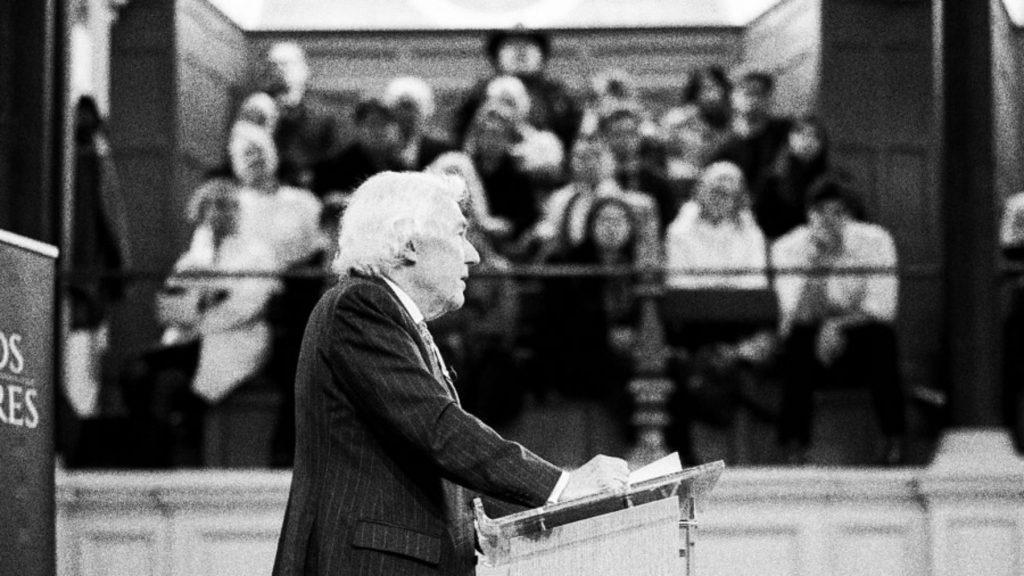
The new right has been obsessed with academia and its supposed exclusion of their champions
But even Pharos itself admits that these high-profile lectures are just the most visible part of its activities. In public remarks in November 2024, its executive director admitted that Pharos was part of wider efforts to win the culture wars.
“Western society will never escape the culture wars if we cannot produce serious culture at scale,” he said, adding that his philosophy was “to move fast and build things”. “Accordingly, Pharos has begun funding to American standards the very best research projects at post-doctoral level across the arts, humanities and social sciences, which would not otherwise receive funding.”
The Pharos Foundation is providing generous research fellowships – paying well above the market rate – to promising early-career academics who fit its ethos. It’s here that Pharos and Paul Marshall align, because through his Sequoia Trust, Marshall has provided £700,000 to date (£350,000 a year) to fund those fellowships, which in gratitude have been named for him. Beyond the formal fellowships, the Pharos Foundation has also given out book grants to fund research, boasting that the first of these has already secured a deal with the prestigious mainstream publisher Allen Lane.
This casts the talent-spotting net even wider. The Paul Marshall ecosystem can not only pick which broadcasters, politicians or pundits it wishes to back, but it can give a huge career boost to academics who might provide the movement with intellectual heft in future, too.
This is the informal cultural network that the right believed the left dominated in the past, replicated deliberately and at scale by a small group of ultra-rich men surrounding Marshall – who between them control or influence bodies at every step of the chain.
A decade ago, almost none of these institutes existed. Today, they are an overlapping network of friends, associates and colleagues. No one needs to give orders or execute secret plans, because they are already on the same page – and with the funding they need to keep operating in sync.
Philanthropy
A notable moment in Marshall’s address at Wadham College was when he stopped to accuse “campaigning groups” of being “really no different from playground bullies” – especially when they targeted him or his businesses.
“The internet is their playground and they use playground tactics to marshal swarms of trolls against their targeted victims,” he said. “Examples of people who operate in this way in this country include Stop Funding Hate, HOPE not Hate, and Led By Donkeys. In the United States, there are multitudes, led by Antifa.”
Marshall’s ire towards Stop Funding Hate is easily explained, and he did so during his talk, setting out how they had led an advertising boycott against his channel. The visual stunts created by Led By Donkeys are a frequent punching bag for GB News. But oddly, Marshall did not elaborate on why he had included the anti-racism and community organising group HOPE Not Hate on his list of “bullies”.
The story might not have made great listening for his Oxford audience. In February 2024, HOPE Not Hate revealed that a pseudonymous Twitter account operated by Marshall had liked a series of extremist far right posts over a course of months.
Posts liked by Marshall claimed that “The native European population is losing patience with the fake refugee invaders”, that “If we want European civilisation to survive we need to not just close the borders but start mass expulsions immediately” and “there has never been a country that has remained peaceful with a sizeable Islamic presence”.
Marshall went further in one case, deliberately retweeting – rather than just liking – a post stating: “The other side is so passionate, so committed to worshipping Satan, evil, homosexuality [sic] and corrupting children, that even if god wasn’t real, believing in him to fend these demons off is preferable.”
To many, retweeting and liking that kind of content from a private Twitter account is a giveaway of someone’s underlying views, whatever they might claim to the contrary in public – though Marshall may choose to say that retweets are not endorsements, and he was just using “like” to bookmark a long series of hateful and Islamophobic posts.
Either way, the row cost him a prominent public position in the organisation that first brought him into British political life proper.
Suggested Reading
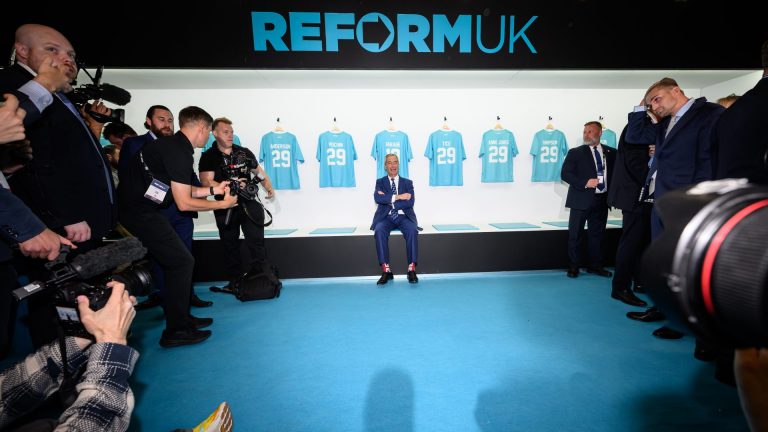

The Reform party conference and the end of democracy
Marshall was one of the founders, and the primary financial backer, of the Ark schools academy network. Ark – an acronym favoured by Marshall, short this time for Absolute Return for Kids – is a genuinely impressive success story, into which Marshall has poured tens of millions of pounds a year.
Most of the schools are “good” or “outstanding”, their exam results are far better than the national average, as are their rates of getting children into university – and all of this is done with a genuinely mixed and diverse intake of pupils.
It was for his work with Ark that Marshall was awarded his knighthood, and before he became the polarising figure he is today, Marshall’s accomplishments were heralded from across the political spectrum.
Marshall was still the chair of Ark schools network at the time of HOPE Not Hate’s revelation of Marshall’s social media activity, and in public the academy chain stood by him, even as teachers in the schools gathered signatures for a petition to unseat him.
A few weeks later, though, it was reported that Marshall had stepped down as both chair and as a trustee of Ark, in a move it insisted had been planned for months, but which had never been publicly announced. Whether forced or not, Marshall’s departure took the heat out of the running scandal – and Marshall clearly bears ongoing anger at HOPE Not Hate over their reporting of his actions.
However, in practice Marshall is less separated from Ark than his resignation might make it appear. Not only does he still support the organisation financially – and surely few would want him to stop doing that – but he still sits as a trustee on a smaller, four-man board overseeing “the central Ark charity”, alongside Conservative peer and former treasurer Stanley Fink.
Even when publicly shamed and cancelled, Marshall gave up only the most visible of his roles in connection with a network of state schools at which 70% of pupils are from ethnic minorities. Can cancel culture really be such a dangerous bogeyman in such a world?
The Marshall Plan
When looking at the scale of the Marshall influence operation, it is important to remember one crucial thing – so far as the laws and the rules are concerned, Paul Marshall has done absolutely nothing wrong. His charities and companies file their accounts on time, declare what they have to declare, and it is up to the politicians employed as presenters to disclose their outside payments.
The UK has a system in which a TV channel can pay a political leader almost half a million pounds a year and give him an hour an evening to react to his rivals without breaking a single rule.
A savvy rich man can build an apparatus out of this to spot talent, pick winners, and control the flow of ideas. All of it is allowed – in 2025, only a fool or an unambitious man need bother donating to politicians or political parties directly.
If every political cause appealed to multimillionaires to the same extent, perhaps this would be fine. But despite George Soros being a global hate figure for the far right and new right alike, he has never operated a network nearly as effective as that of Marshall. He has never employed politicians, never operated TV networks, and even his vaunted network of not-for-profits isn’t what it was – Soros’s foundations have largely pulled out of funding UK media.
In America, the new right movement around Trump built the kind of network they’d always accused the “leftists” of having – something that could create news and dominate the cycle, win over young converts, and create a media ecosystem so strong that it dragged the centre of political gravity in their direction. America’s political and media ecosystem is so rife with money, though, that doing so cost hundreds of millions, if not billions of dollars.
Here in the UK, everything is cheaper. Marshall’s network has safely hedged its bets, being safely in with Reform for the moment, but with a clear and open door to the Conservative Party should it somehow recover. It has learned all the lessons of Project 2025 and the US networks, and brought them to the UK for a fraction of the cost.
Suggested Reading
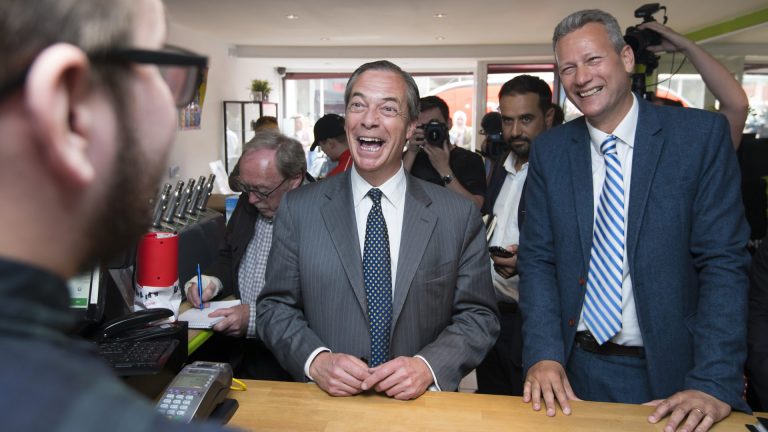

What’s the real story behind Nathan Gill, Reform and Russia?
GB News might lose tens of millions a year, but Marshall, Chandler and their colleagues have tens of millions to lose. Marshall’s Sequoia Trust alone, which funds his not-for-profit operations, has more than £400m in investment assets. Marshall is not running out of steam – he can keep this up for as long as it interests him.
Those who have a vision of the future different from Marshall’s, though, only have so long to wake up to what is happening in the UK. Every day, Donald Trump shows what can happen if a dangerous populist is propelled to power by people who think he’ll serve their interests. What would a Nigel Farage premiership – or a Robert Jenrick one – look like here?
There is simply no equivalent to Marshall’s network on the political left. There is no TV channel paying Labour politicians hundreds of thousands of pounds a year. Labour’s think tanks get much of their funding from unions, and produce worthy policy ideas that typically go on to be ignored by ministers.
No one is funding mega-conferences with politicians from around the world to give rising stars a platform. All of the infrastructure Marshall and his friends have built exists for the right wing alone.
It is often the impulse of those of us on the left to call on the government to act in these situations – to tighten the rules, close the loopholes, make it so this is not possible.
But such a course of action might well be doomed: it would look politically motivated and vindicative, opening the door to the punishment of opposition by a future populist government.
Starmer’s No 10 would be unlikely even to try. And many would argue, reasonably, that efforts like Marshall’s could not be stopped by the law without genuinely stifling free expression in the country.
The government and the law are unlikely to stop Marshall’s political project. No one is coming to save us – which means we have to do it ourselves.
The organisations and relationships Marshall has built show the power of networks, of collaboration, and of a shared political mission. Marshall’s opponents might not have a rich multimillionaire to pay the bills, but they’ve got everything else, and they’ve got each other.
The options now are to let the Marshall Plan take the nation unopposed, or to build an infrastructure to match it.
As president Barack Obama didn’t quite say: don’t boo. Organise.
Disclosure: James Ball has written for UnHerd and the Spectator. A previous employer, the Bureau for Investigative Journalism, received funding from the George Soros Open Society foundation



